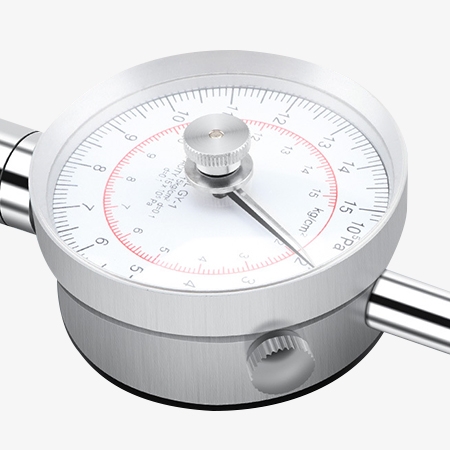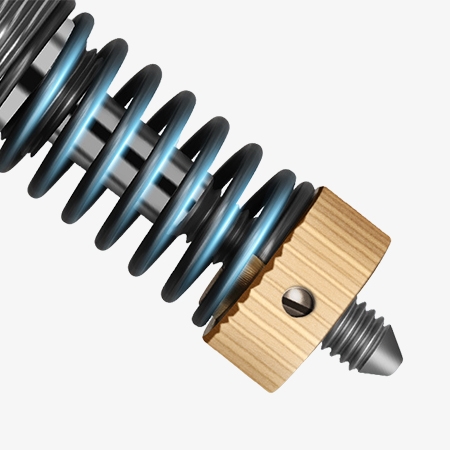An analog fruit hardness tester is a simple, mechanical device used to measure the firmness of fruits without relying on batteries or electronic components. Unlike digital testers, which provide electronic readings, analog testers rely on a spring-loaded or mechanical dial gauge to indicate the hardness value of fruit. Its straightforward design makes it an essential tool for assessing fruit maturity and ensuring optimal flavor and shelf life.

Equipped Analog Dial
- Simplicity and Ease of Use. An analog dial fruit hardness tester is straightforward to operate. User can immediately read the hardness value as the indenter penetrates the fruit without navigating complex menus or settings.
- Robustness and Durability. Analog device is mechanically designed and generally more robust than electronic counterparts. It is less sensitive to power fluctuations, humidity, and dust, which is common in orchards and packing facilities. This mechanical reliability ensures long-term consistent performance without frequent maintenance or battery replacements.
- No Dependence on Power Source. Analog tester operates without electricity or batteries, making it ideal for remote locations or outdoor environments.

Fruit Firmness Tester Adopts Spring Conduction
- Simple, Direct Mechanical Structure. The spring-based design keeps the instrument mechanically simple. Because it does not rely on electronic components, sensors, or batteries, the hardness tester is easier to maintain and less prone to malfunction.
- Long Service Life with Consistent Performance. Spring mechanisms are known for their durability when properly maintained. Analog hardness testers built with high-quality springs can deliver accurate performance for a long time.
Applications
SISCO's analog fruit hardness tester is widely used in agriculture, food processing, and research to evaluate fruit quality. In agriculture, it helps farmers determine the optimal harvest time by measuring the firmness of fruits such as apples, pears, peaches, and citrus, ensuring peak taste and shelf life. Food processing industries use it to monitor fruit texture during storage and processing, ensuring consistency in products like juices, jams, and canned fruits.

Pear

Apple

Cherry

Strawberry
| Model | SISCO-HT-GY-1 | SISCO-HT-GY-2 | SISCO-HT-GY-3 | |
| Indication Scale | 2-15kg/cm2(×105Pa) | 0.5-4kg/cm2(×105Pa) | 0.5-12kg/cm2 | 1-24kg/cm2 |
| Indenter Size | Φ3.5mm | Φ3.5mm | Φ11mm | Φ8mm |
| Accuracy | ±0.1 | ±0.02 | ±0.1 | |
| Applicable Fruit | Firm-textured fruits (apple, pear) | Soft-textured fruits (strawberry, cherry) | Firm-textured & soft-textured fruits | |
| Insertion Depth | 10mm | |||
| Dimension | 140*60*30mm | |||
| Weight | 0.3kg | |||
Structure:

Q1: What is an analog fruit hardness tester?
A1: An analog fruit hardness tester is a mechanical device used to measure the firmness or ripeness of fruits. It typically consists of a spring-loaded plunger or indneter that is pressed into the fruit, and a dial gauge displays the hardness value of the fruit.
Q2: How to maintain the analog fruit hardness tester?
A2: To maintain an analog fruit hardness tester, first ensure it is cleaned after each use with a soft, damp cloth to remove juice or debris, avoiding harsh chemicals. Keep the device dry to prevent corrosion. Regularly check the spring and moving parts for smooth operation and lightly lubricate with a small amount of lubricating oil if needed. Store the tester in a protective case to prevent damage and avoid dropping it, as impact can affect accuracy.
Q3: Can this fruit hardness tester be used outdoors?
A3: Yes, an analog fruit hardness tester can be used outdoors, but there are some considerations. These devices are mechanical and don't rely on electricity, making them portable and suitable for field use. However, extreme temperatures, direct sunlight, or high humidity may affect its accuracy and the durability of the components, such as springs and dials. To ensure reliable measurements, it's best to use the tester in shaded, moderate conditions and store it properly when not in use.
Tips: Can analog fruit firmness tester measure soft and hard fruits accurately?
Yes, an analog fruit firmness tester can measure both soft and hard fruits, but its accuracy depends on the device's design and scale range. We offer three types of hardness testers. And you can make your choice based on the fruits you need to test.
Thank you for buying industrial test and measurement equipment on SISCO.com, all products sold by SISCO and the partner cover a 12 months warranty, effective from the date of receiving the products.
What is covered?
SISCO is responsible for providing free spare parts, and free technical support to assist the customer to repair the defective products until the problem is solved.
What is not covered?
- Product purchased from anyone other than a SISCO store or a SISCO authorized reseller.
- Expendable parts.
- Routine cleaning or normal cosmetic and mechanical wear.
- Damage from misuse, abuse or neglect.
- Damage from use of parts other than SISCO approved.
- Damage from use outside the product’s usage or storage parameters.
- Damage from use of parts not sold by SISCO.
- Damage from modification or incorporation into other products.
- Damage from repair or replacement of warranted parts by a service provider other than a SISCO authorized service provider.
- Damage caused by the application environment not meeting the product usage requirements and the failure to perform preventive maintenance.

